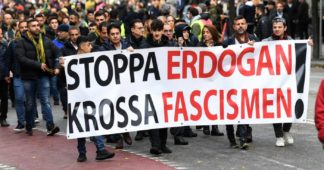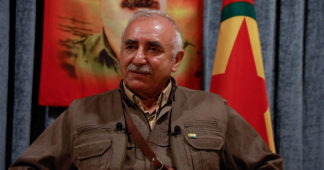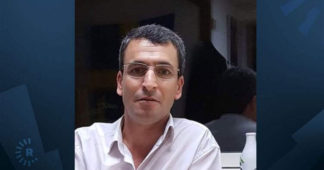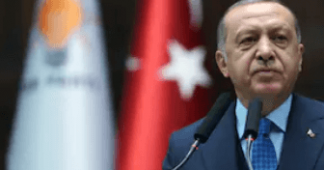Abdullah Ocalan, the imprisoned leader of the Kurdistan Workers’ Party (PKK), has called on the group he founded to lay down its arms and disband in a historic statement shared by pro-Kurdish politicians on Thursday.
Ocalan’s appeal may mark a turning point in the decades-long conflict between the PKK and Turkey, a struggle that has claimed tens of thousands of lives over the past 40 years.
In a one-and-a-half-page statement, Ocalan explained that armed struggle against the state was once necessary due to policies that denied Kurdish identity and restricted Kurdish rights and freedoms.
“The PKK was born in the 20th century, in the most violent epoch of the history of humanity, amidst the two world wars, under the shadow of the experience of real socialism and the cold war around the world,” he said.
“The outright denial of Kurdish reality, restrictions on basic rights and freedoms – especially freedom of expression – played a significant role in its emergence and development.”
Ocalan said, however, that because of democratic steps taken by the Turkish government on Kurdish issues, along with regional developments, armed resistance no longer holds any meaning.
“All groups must lay their arms and the PKK must dissolve itself,” he said. Ocalan’s call for “all groups” indicate that he means all PKK offshoots in Syria and Iran.
Ocalan added that a separate nation-state, federation, administrative autonomy or culturalist solution for the Kurds fail to answer Turkish society’s needs.
“Respect for identities, free self-expression, democratic self-organisation of each segment of society based on their own socio-economic and political structures are only possible through the existence of a democratic society and political space,” he said.
“There is no alternative to democracy in the pursuit and realisation of a political system. Democratic consensus is the fundamental way.”
Ocalan’s message was read aloud by the so-called Imrali Delegation, a group of pro-Kurdish Dem party politicians who visited him on Thursday at Imrali Island, where he is imprisoned.
The delegation included a lawyer representing Ocalan and a Dem politician considered to be close to the PKK headquarters in the Qandil mountains in Iraq.
The statement was broadcast live on large screens in the eastern cities of Van and Diyarbakir.
Salih Muslim, co-chair of the Democratic Union Party (PYD), a Syrian Kurdish PKK affiliate, told Al-Arabiya that his group agrees with Ocalan’s statement.
“We are waiting for what the Kurdistan Workers’ Congress decides,” he said. “There would be no need for weapons if we were allowed to work politically. If the reasons for carrying weapons disappear, we will lay them down.”
Turkey, the European Union and the United States classify the PKK as a terrorist organisation due to its attacks on civilians.
Negotiations between Ocalan and the Turkish government began last year and were publicly revealed by Turkish nationalist leader Devlet Bahceli, chairman of the Nationalist Movement Party (MHP) and an ally of President Recep Tayyip Erdogan.
In October, Bahceli invited Ocalan to address parliament to formally call for the PKK’s disbandment, potentially paving the way for a legal process that could allow Ocalan’s release under the “right to hope” principle. This principle rejects life imprisonment without parole and limits sentences to a maximum of 25 years.
Many insiders in Ankara believe the government’s motivation for engaging in talks with Ocalan is linked to escalating regional tensions between Israel and Iran.
Turkish officials reportedly fear that the Kurdish issue could become a strategic vulnerability and believe that resolving it is key to stabilising both Turkey and the wider region.
As part of the discussions, insiders suggest that a modus vivendi (a practical arrangement) could be established with Syrian Kurdish groups linked to the PKK, such as the US-backed Syrian Democratic Forces (SDF), which has been a key partner for Washington in the fight against the Islamic State group.
A Turkish source familiar with the matter told Middle East Eye that Ankara largely expects the PKK to comply with Ocalan’s call, though some factions may resist. “Those who refuse to comply will be dealt with using the full force of the military and the law,” the source said.
Since 2016, Ankara has successfully expelled the PKK from Turkey by employing advanced military technology, including armed drones and electronic warfare capabilities. The Turkish army’s forward outposts in northern Iraq have also blocked the group’s traditional access routes into Turkish territory, significantly reducing its operational capacity.
PKK leaders have repeatedly stated they will heed Ocalan’s message and act accordingly.
Throughout this process, Erdogan has taken a back seat, allowing Bahceli to bear the political risks.
However, he has occasionally made statements signalling his involvement in the negotiations.
We remind our readers that publication of articles on our site does not mean that we agree with what is written. Our policy is to publish anything which we consider of interest, so as to assist our readers in forming their opinions. Sometimes we even publish articles with which we totally disagree, since we believe it is important for our readers to be informed on as wide a spectrum of views as possible.











